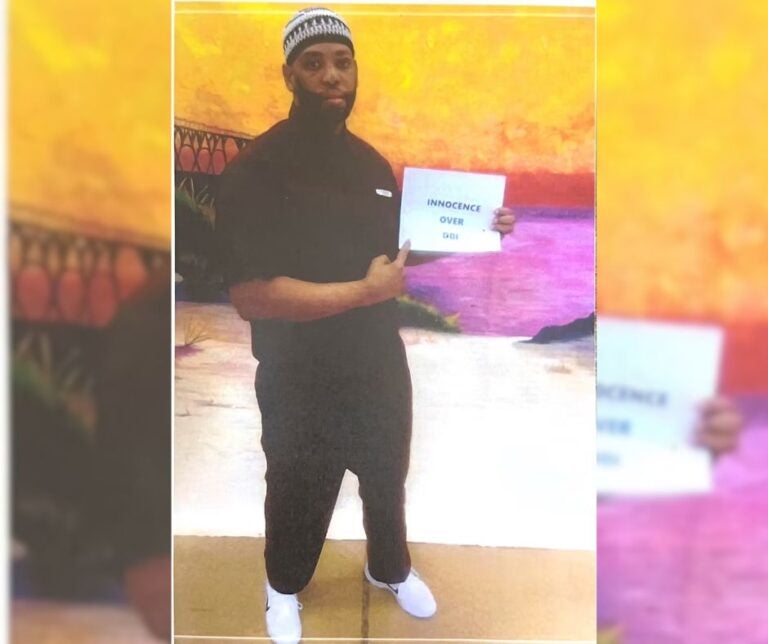Studio 2 Extra: Wrongfully convicted and finally free after 26 years
Tyree Wallace spent 26 years in prison for a crime he didn’t commit, after pleading guilty to a lesser charge. He’s now fighting to clear his name and seek justice.
Listen 15:56
(Courtesy of freetyreewallace.com)
In 1997, Tyree Wallace was just 19 years old when he was arrested and convicted for the murder of South Philadelphia business owner John Su Kang. There was no physical evidence linking Wallace to the crime. Witness testimonies were riddled with inconsistencies, and one key witness even recanted their statement. Yet, despite Wallace’s repeated declarations of innocence, prosecutors pushed forward with a case that ended in a life sentence.
Fast forward 26 years, and Wallace is finally free. But his release wasn’t the result of exoneration; instead, he was granted time served after pleading guilty to a lesser charge of third-degree murder this past November. His case, a window into the systemic failures of the criminal justice system, is also a testament to the endurance of the human spirit in the face of crushing adversity.
“It felt like my soul died a little bit,” Wallace recalled. “Everyone in that room knew that what they had me raise my right hand and swear an oath to say was not true.”
Wallace spent his entire twenties, thirties, and most of his forties behind bars. When the opportunity to leave prison presented itself, it came with an impossible choice: fight for full exoneration and risk dying in prison, or accept a deal for freedom at the cost of the truth.
“The reality was either I’d ‘right-fight’ and die in prison or accept the lesser option and be home enjoying the new year, sitting here at this interview,” Wallace said, “I had to come home.”
The cracks in Wallace’s case ran deep. His attorney, Keir Bradford-Grey, described how key testimonies were manipulated, alternative suspects ignored, and a narrative manufactured by police and prosecutors to clear the case in the name of “community safety.”
“Tyree was not the original suspect in his case,” said Bradford-Grey. “There were several other people that were named. It wasn’t until one guy wanted to get out from under six armed robberies that [they] started to develop a narrative that included Tyree….Officers took it and ran with it because, who’s going to believe Tyree?”
Wallace’s story is not an anomaly. Bradford-Grey argues it reflects a troubling pattern in 1990s Philadelphia, when law enforcement was under immense pressure to solve cases during the so-called war on crime.
“There was no accountability for the way in which they did this,” she said. “There was no transparency about what they did and how they did it.”
A turning point came with the election of Philadelphia District Attorney Larry Krasner and his beefing up of the Conviction Integrity Unit. Under Krasner’s leadership, Wallace’s legal team gained access to critical police files, exposing a deeply flawed investigation that had sealed his fate decades earlier.
While Wallace’s release is a hard-fought victory, it’s far from the justice he seeks. He is free, but his name is not yet clear. And while Wallace refuses to let bitterness consume him, he is angry.
“[But] I don’t believe that anger in and of itself is a negative emotion,” Wallace said. “Some of the greatest things that have happened in our country happened because people were angry. I’ve decided to make sure that I take that emotion and funnel it to something positive.”
Wallace has transformed his anger into advocacy. As one of the founders of MannUp, a program designed to prepare incarcerated men for life after prison, and the nonprofit Systemic Reformative Change (SRC), he is working to ensure that others don’t suffer the same fate. His mission is rooted in accountability and reform, not only for the system that failed him but also for those who continue to navigate its injustices.
But his ultimate goal remains personal: to clear his name and expose the full extent of the injustices he endured.
“Resilience lies within all of us,” Wallace said, a mantra he embodies in his work and life.

WHYY is your source for fact-based, in-depth journalism and information. As a nonprofit organization, we rely on financial support from readers like you. Please give today.






